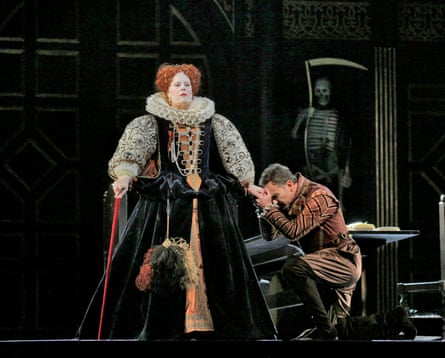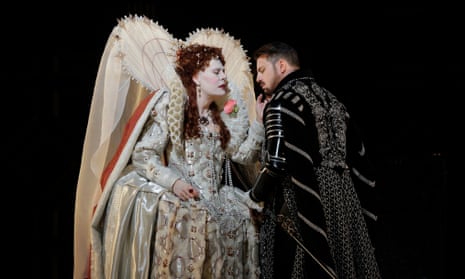At one high-stakes moment during the the third act of Donizetti’s Roberto Devereux, Queen Elizabeth I sings a passage that the New York Metropolitan Opera’s English supertitle system translates like so: “I am talking. Listen to me.” Though because Sondra Radvanovsky is the soprano who happens to be singing the role, this spring, the textual meaning of the line has a superfluous feel. When Radvanovsky is on the house’s stage, paying attention to anything else seems like the wrong call.
Already, this season, she has turned in memorable performances – as a singer and as an actor – in Donizetti’s two other, so-called “Tudor Queen” operas (specifically, the title roles in Anna Bolena and Maria Stuarda). For director David McVicar’s new-production run of Devereux, which opens on Thursday night, she will be completing a single-season programming feat first made famous by Beverly Sills. Radvanovsky is upfront about the fact that Donizetti didn’t conceive of these operas as a formal trilogy. But putting them on in the same year is a delight for bel canto fans. And given the power of Radvanovsky’s voice, her performances offer an invaluable chance to hear these operas with fresh ears.
After an impressive final dress rehearsal on Monday morning, I sit outside the singer’s dressing room as makeup artists peel away the layers of stark-white pallor that she is using in her portrayal of a late-in-life Virgin Queen. At one point, Plácido Domingo glides past with such suavity, I barely register that he is cutting the line entirely. (It’s cool; he’s earned it.)
When I have my audience, I ask how it feels to be nearing the completion of a run that poses some taxing dangers for a soprano’s voice. “It’s been exhausting, I’m not going to lie to you,” she says. “They’re not easy operas. Singing bel canto is like walking on a tightrope – especially with a larger voice, like mine. So, it’s constantly living like a nun: not going out, not talking a lot.” After knocking the wood of the piano bench in her dressing room, she adds: “I don’t want to cancel a show, because people have paid to come hear me sing the three queens. So … I wash my hands constantly; they’re raw from washing. I’m going to the gym and really taking care of myself and trying to stay fit, eating properly. Anything I can do.”
The strength she’s been hoarding is unleashed in her performances. Weighed down under a convincingly luxe recreation of a Gloriana dress, Radvanovsky cultivates a regally powerful tone while also moving around the stage with a slight tremor – an affecting contrast that underlines Donizetti’s dramatic rendering of an absolute ruler who can’t get the emotional commitment she most desires.

“Temperament can really take a toll on the voice,” she says. “If you get tight in your body with the acting, then you can get tight in your voice. And then you can get tired, and you can damage yourself vocally.” Her vocal coach, she says, “was here today, watching the final dress with me and the costumes: ‘Are the costumes getting in your way? Is the latex on your face and neck and head getting in the way?’ … The director’s like: ‘No, I like it when you don’t have that center; I like it when you’re kind of wobbly. And I say: ‘Well, there’s acting wobbly and then actually being wobbly.’”
Her sound in the Met has been remarkably sturdy, of late. The soprano has an ability to project delicate bel canto effects in a way that feels as if it shakes America’s biggest opera house. In our conversation, I tell Radvanovsky that, in these moments, the acoustic impression left by her technique reminded me of the circular-breathing theatrics of the most powerful avant garde saxophonists. The pitch and vibrato remain the same, but streams of steadily increasing volume sound like they’re vaulting over one other. “It took 46 years to learn how to do that,” she replies (before amending with “well, maybe not quite that long”).
“When you do a messa di voce, that means you start soft, you crescendo into loud – and then you go back to soft again. Some people call it circus tricks, but in bel canto it’s really written into the music. And that’s another thread with these three queens. In [Maria] Stuarda there’s a lot of it, whew! But in a 4,000-seat opera house, it’s different. So many people sing soft and they close their throat. You cut the air off and then you’re stuck. So you have to keep your throat open. You have to put that air through it. It’s just practice. I have young opera singers come up to me, saying: ‘Sondra, I have one hour. Show me how to do this.’” And then she gave a smile that was perhaps a bit queenly. “I just say: ‘Riiight.’”
Despite these easily recognized strengths, she’s not through working on the music required by these operas. “Most people, as they get older, the voice gets heavier. They go from this kind of repertoire into Tosca and [Un] Ballo [in Maschera]” – roles which Radvanovsky tackled first. “Beverly Sills definitely had a lighter instrument. … It was thrilling just to listen to what she did with her voice – a completely higher-line voice with fireworks that, naturally, my voice doesn’t do. I have to work. And it’s like training for a marathon. I have to do the scales and get that agility into it.”
Still, the soprano professes satisfaction with the state of her sound, right now. “This is the music that I always wanted to sing. I knew about Anna Bolena because I heard Maria Callas’s recording and thought: ‘Wow what is that?’ … And when I was a kid, I wrote a book report on the Beverly Sills book, Bubbles [A Self Portrait]. Just as with Plácido sitting in my dressing room, here, a few minutes ago – it’s all coming full circle.”
- Roberto Devereux plays at the Metropolitan Opera, New York from 24 March through 19 April, and will be broadcast to cinemas around the world on 16 April

Comments (…)
Sign in or create your Guardian account to join the discussion